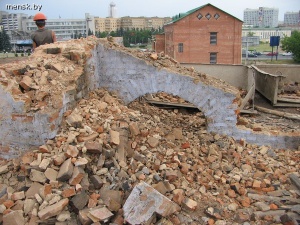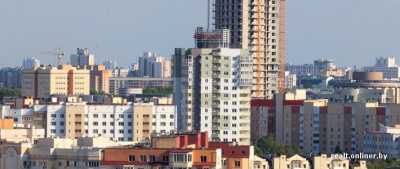Construction Boom in Minsk: Happy Businessmen and Unhappy Public

On 13 March, Belarus hosted a high level guest – Serbian president Tomislav Nikolić. Nikolić and Serbian businessman Dragomir Karić symbolically launched a new construction project near national library. Today Serbian company Astra Investment is one of the largest investors in Belarus development sector.
Development remains one of the few industries foreigners eagerly invest in Belarus because of high and quick profit. Meanwhile, Belarus authorities struggle with other problems of urban development. They fail to properly regenerate the Old Town of Minsk and their policy of compaction of districts in already densely populated city causes protests of locals.
Thriving Capital
Although Belarus experiences economic stagnation and resists market reforms, the intensity of development and construction makes an impression of a thriving area. Indeed, development presents one of the few sectors that foreign companies readily invest in Belarus.
In this most cases foreign does not mean western, as investors come from Arab countries, Russia, Iran, Turkey and China. Serbian Astra Investment serves perhaps the biggest investor at the moment. Its projects, Majak Minska (Lighthouse of Minsk) includes a shopping and entertainment complex and several housing projects.
Construction especially flourished after 2009, when the International Ice Hockey Federation chose Minsk the venue for the 2014 championship. The event seems especially important for regime’s image and international legitimation, therefore authorities do their best to prepare the capital for the upcoming championship. The amount of work is substantial – Minsk definitely lacks tourist infrastructure.
However, as it usually happens in Belarus, people do not know how the deals are made. This behind-the-scene politics causes discontent of the public. This discontent is fairly justified – very often good pieces of Belarusian land go to president’s friends without asking people’s opinion.
For example, in 2012 an official document with a mark “confidential” appeared in Belarusian Internet. According to it, Aliaksandr Lukashenka ordered to grant Qatar state (in fact its ruling family), lands near Minsk for building residence and open-air hunting cages. Expensive lands near the capital should be granted for free for 99 years. Such generous presents of course are a part of bigger deals that the authoritarian leader makes with his Arab counterparts.
The Tragedy of Minsk Old Town

Regeneration of old building remains a disaster in Belarus. Denationalised Belarusian bureaucracy does not realise the value of architectural heritage and do not want to stick to legislation on urban development during the restoration of old buildings.
Most famous cases from recent decade include reconstruction of Old Town in Hrodna, a town with old European architecture in Western Belarus.
Authorities conducted reconstruction with numerous violations. They did not conduct archaeological excavations and damaged a layer of remnants of the mediaeval city; changed traditional planning of Old Town; destroyed some buildings and built them from modern materials instead of restoration. As a result, the biggest Old Town in Belarus turned into typical town of Lukashenka period.
Minsk is in a similar situation now. Poor reconstruction of Old Town of Minsk started in USSR already. Today, in independent Belarus the authorities continue to destroy the historical face of the city for reasons of quickness and minimization of cost. The 2014 ice hockey world championship makes the authorities hurry in their preparations.
Among the biggest problem of renovation experts name the destruction of former planning of the streets and buildings. While a single wrongly erected building can be destroyed and restored, the rebuilding of the whole planning seems hardly possible and will be extremely costly in future. Another task during regeneration is to preserve the past cultural landscape, but Belarusian authorities prefer to turn Minsk Old Town into a business-centre.
According to historian Zachar Šybeka, one of the best experts on Minsk history, normally the Old Town becomes conservation zone, where new construction is prohibited. In Belarus, he says, such norms do not exist in law. As a result, modern buildings appear in the centre. They overshadow the historical architecture and make the whole view ridiculous.
Sadly, authorities even abuse religious monuments like church complexes. Instead of giving them back to church, officials use buildings for state purposes. In one case, they even presented a plan to turn a former monastery building into hotel with casinos.
Compaction of Housing

Rapid growth of construction results in the lack of free space in the city. Notably, Lukashenka prohibited the spread of the city and building on agricultural lands. Authorities offered an alternative solution – to boost “satellite towns” that lay near Minsk. Citizens that need housing can build it in those towns now.
However, new elite housing and business and shopping centres mushroom in the city, and somehow authorities manage to find land for them. Clearly, those projects are highly profitable and Minsk authorities do not miss a chance to earn some more cash and report to the top about their success.
The government promotes policy of compaction of some communities to create new places for profitable projects. This policy sparked social tension and protests of city dwellers. Politically indifferent Belarusian may become very active and aggressive when the deal concerns their property. Take for example the case of Uručča conflict.
In spring 2012 dwellers of Uručča district protested against building of several houses, some of them were assigned for riot police families. This fact stirred up the discontent with authorities because Belarusians perceive police as a part of the regime. Still, dwellers had no chance to win in this case.
Similarly, owners of the housing in the central district resist the plans of authorities to evict them or rebuild the part of houses and implement other projects. Such sporadic protests appear here and there and authorities have to compromise. They organise civil discussions, where experts, architects, officials and citizens discuss the construction plans.
So far, the discussions appeared not quite fruitful, as sides do not want to listen to each other and retain their positions. Nevertheless, authorities accept that such protests indeed prevented some projects or changed them. “Prevention of social tension”, the term that authorities use, shows that even in today's Belarus people can effectively defend their interests if they organise.




